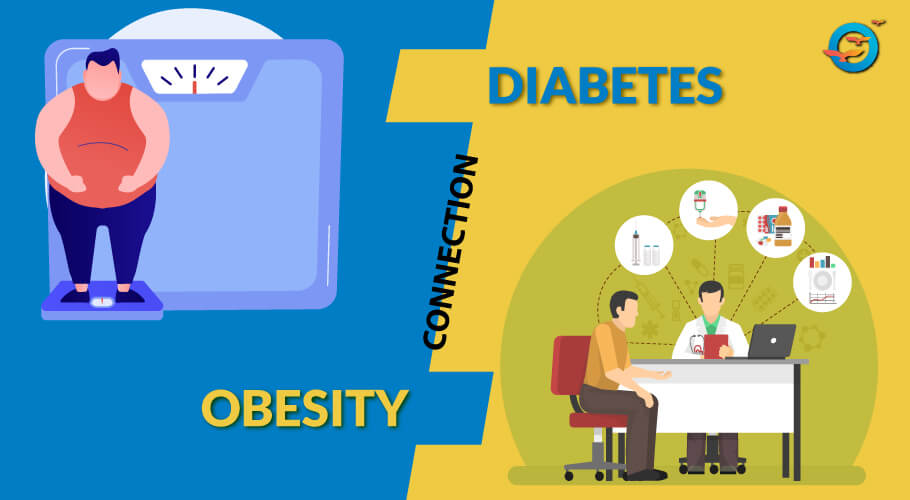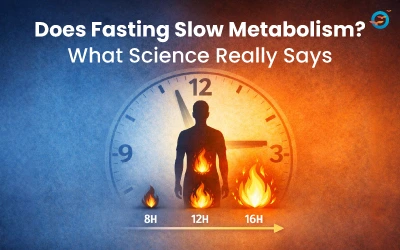Relation between Obesity and Diabetes?

The obesity-diabetes connection
There is a silent pandemic raging unnoticed in our midst and it is wreaking havoc on the health of millions worldwide. The pandemic we’re referring to is obesity. It hits almost one in three persons—higher in some countries, and it brings a variety of so-called 'lifestyle disorders’, ranging from diabetes to heart disease to psychological issues.
The link between obesity and diabetes has been the subject of many studies and the findings are constant: a BMI equal to or greater than 30, which is the clinical determinant for obesity, raises the risk of contracting diabetes to 90%!
Barely a few decades back less than 170 million worldwide were estimated to have type 2 diabetes, that number has already doubled and doubled again many times over. This increase in numbers corresponds to the rise in diabetes too. This is not a coincidence. There is a very strong causal link between the two. The good news is that reducing excess weight, even by 10%, leads to a marked improvement in blood sugar numbers and overall quality of life.
This article dives into the connection between obesity and diabetes, and what you can do to reduce your risk.
The underlying cause of diabetes is insulin resistance, and obesity plays a major role in this. Very simply, your pancreas contains a type of cells known as β-cells. Their job is to produce insulin. When you eat any food containing carbohydrates, it converts into insulin and is released into the bloodstream where its presence causes the β-cells to produce insulin.
When the fat starts to accumulate around your midsection, it slowly chokes your internal organs, including the pancreas, and compromises the β-cell's ability to produce insulin. This is how insulin resistance occurs. It further leads to high fatty acids in your blood from where the fat enters your cells. Here it blocks glucose from entering the cell, where it can be synthesized to create energy. As a result glucose levels rise in your bloodstream, leading to diabetes.
When blood glucose rises in obese individuals, adipose tissue (fat) releases a series of compounds including non-esterified fatty acids, glycerol, hormones, pro-inflammatory cytokines, and certain other factors that promote the development of insulin resistance.
Thus both type 2 diabetes and obesity are associated with insulin resistance. Sometimes we come across obese persons who are not diabetic. However, they are most likely already insulin-resistant. It’s just that their pancreatic β-cells are still able to release adequate insulin that is sufficient to overcome reductions in insulin sensitivity.
This enables them to maintain normal glucose levels. But it is a slippery slope and can at any moment trigger the slide into diabetes. Obesity almost always causes pre-diabetes, which is almost always a precursor of type 2 diabetes.
Excess weight and obesity have been linked to many chronic non-communicable diseases, including type-2 diabetes and its many complications. The rise in blood sugar leads to damage of micro and macro blood vessels, thus affecting almost every organ in the body, from nerves and eyes to kidneys and the heart.
Are you at risk?
The first sign of insulin resistance in males begins by fat deposition in the belly and in females, it appears as fat accumulation around buttocks first and then around thighs and waist.
Measuring your BMI can tell you if you’re at risk of becoming insulin resistant. To calculate your BMI divide your weight in kilograms by your height in meters squared. If the number you get is less than 25, you’re safe. If it’s between 25 and 30 you’re headed towards obesity and need to make urgent changes to your lifestyle.
What can you do?
There are three fundamental causes for insulin resistance: bad (unhealthy, un-nutritious) diet, insufficient exercise, stress.
Addressing all three simultaneously is the only way to sustainably turn back the clock and regain your health. This is why, at FFD, our programs for weight loss and diabetes reversal are driven by our four protocols of diet, exercise, inner transformation, and medical.
For more in-depth information on how you can work these protocols to drop the kilos and your blood sugar levels, subscribe to our Youtube channel and Facebook page. We regularly share informative posts and videos to help people suffering from insulin resistance-related problems cope and reverse their problems.
You can also log on to participate in our WoW Wednesday sessions, which are live-streamed on Youtube and Facebook and can be viewed at no cost. For a formal session on diabetes and the science behind our reversal successes, register for one of our regular Discover Reversal Session
Disclaimer:
This Blog solely serves our marketing purposes, for Authentic knowledge for this topic, Please join our Discover Reversal Session

